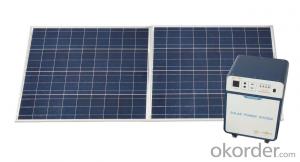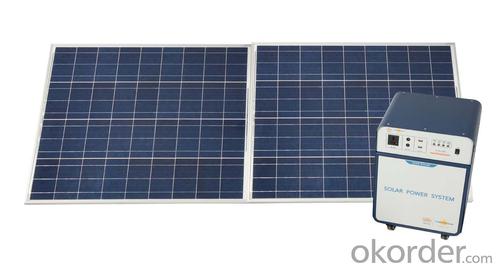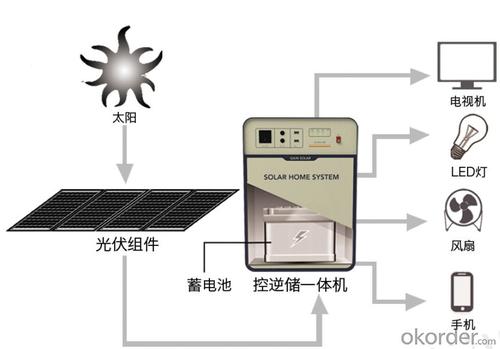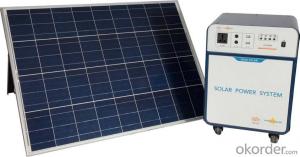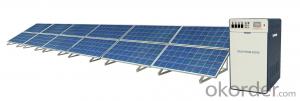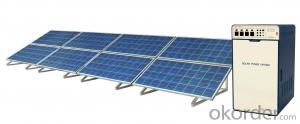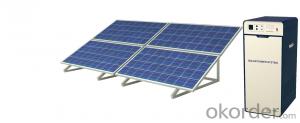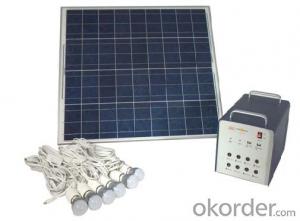Greenlogic Solar Energy Systems - Off-Grid Solar Power System JS-SPS-300
- Loading Port:
- Tianjin
- Payment Terms:
- TT or LC
- Min Order Qty:
- 10 set
- Supply Capability:
- 10000 set/month
OKorder Service Pledge
OKorder Financial Service
You Might Also Like
General Introduction
Solar power system provides alternating current and direct current, which is produced by the modules transforming solar power into power, to home lighting, household appliance and other DC appliance, such as cell phone and laptop.
Solar power system is widely used in area lack of power, for example house power supplying, monitoring, communication base, fire prevention in forest area, pasture and meadow, aquaculture etc.
We are dedicated to provide high quality off-grid PV products and systems to customers and has received a series of certificate, including ISO9001, TUV, UL, CE, CQC and RoHS.
Off-grid Solar Power System
High efficent PV module can produce more power.
Sine wave output is suitable for all kinds of load. Varieties of DC output, let it more convenient for users.
The multifunction design make it easy to operation and maintenance.
Off-grid Solar Power System Parameters
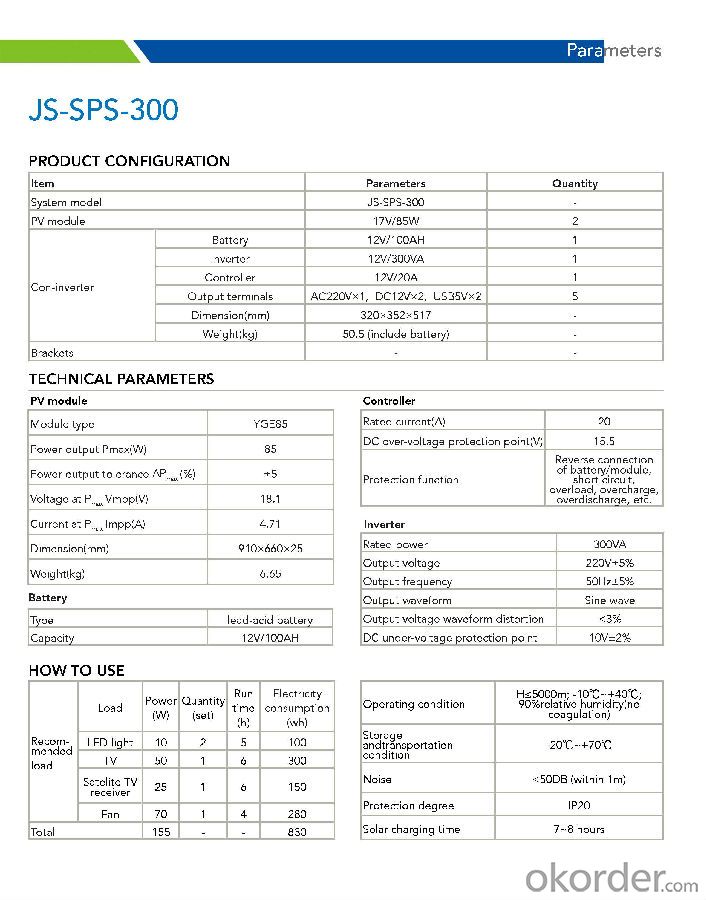
Off-grid Solar Power System Application
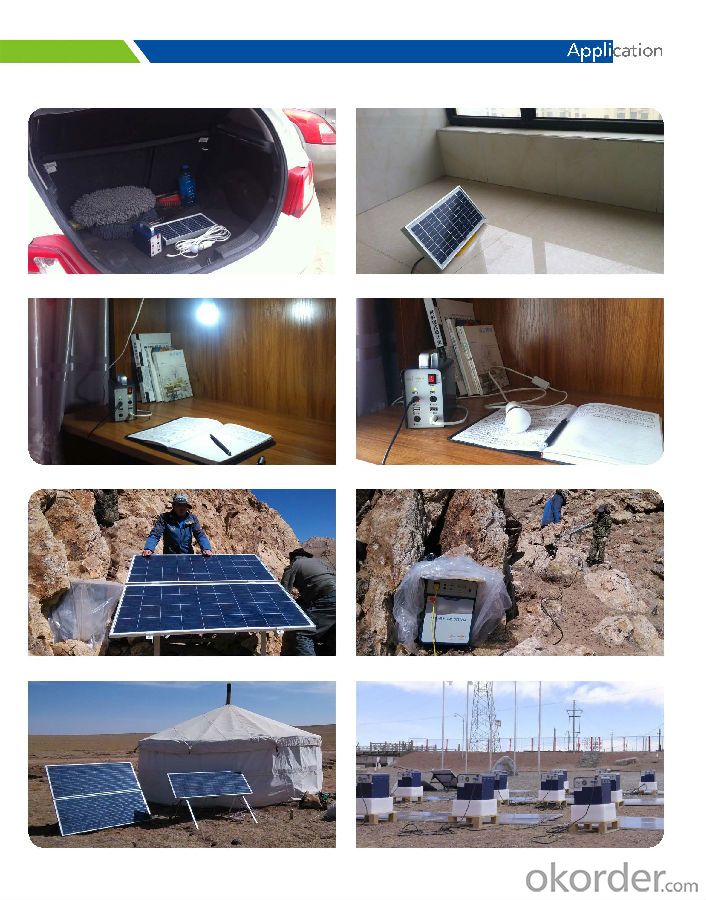
Our Factory
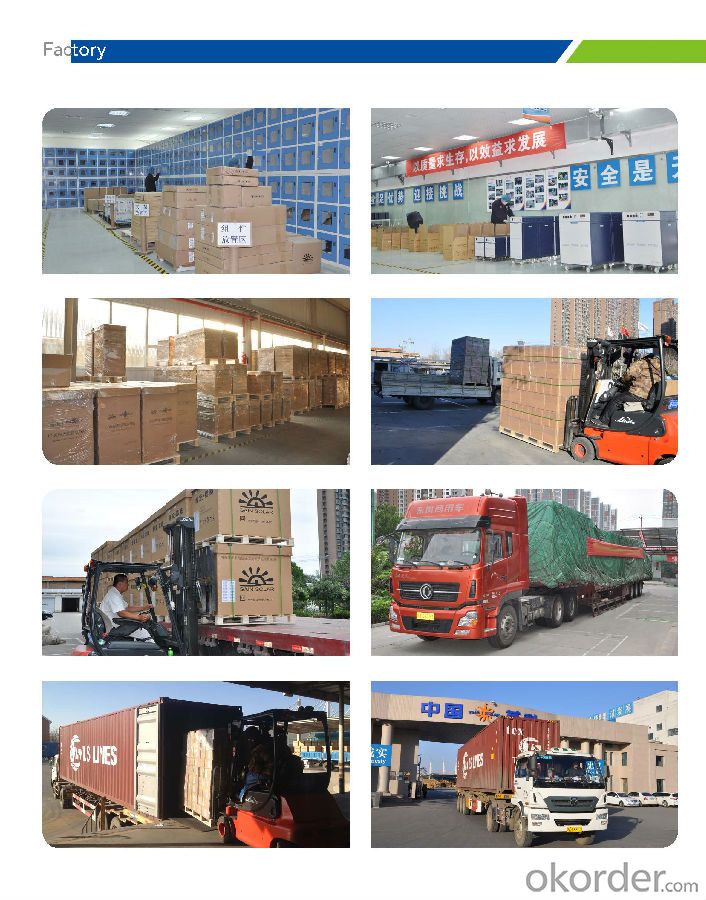
- Q: Are there any risks of electromagnetic radiation with solar energy systems?
- Solar energy systems have potential risks related to electromagnetic radiation. These systems utilize photovoltaic panels to convert sunlight into electricity. The panels produce direct current (DC) electricity, which is then changed to alternating current (AC) electricity for use in homes and businesses. One potential source of electromagnetic radiation is the inverter, responsible for converting DC electricity to AC electricity. In some cases, these inverters may generate electromagnetic fields (EMFs) that emit low-frequency radiation. Although these EMFs are generally considered low and within acceptable limits, ongoing research aims to better understand any potential health effects from long-term exposure to these fields. Another risk involves high-frequency electromagnetic radiation from radio frequency (RF) communication devices, like wireless monitoring systems or communication modules used in solar energy systems. These devices wirelessly transmit and receive signals, causing concern about potential health effects from long-term RF radiation exposure. However, these devices typically have low power levels and are designed to comply with safety standards and regulations. It's important to note that the risks associated with electromagnetic radiation from solar energy systems are generally considered low compared to other everyday sources, such as cell phones, Wi-Fi routers, or power lines. Nonetheless, it is always advisable to follow safety guidelines provided by manufacturers and industry standards to minimize potential risks.
- Q: Can solar energy systems be used for powering shopping malls?
- Certainly, shopping malls can indeed utilize solar energy systems to power their operations. The sun's energy can be captured by installing solar panels on the rooftops or parking lots of shopping malls. This captured energy can then be converted into electricity, which can be used to power various functions within the mall, such as lighting, heating and cooling systems, escalators, elevators, and other electrical appliances. By embracing solar energy, shopping malls can greatly reduce their reliance on conventional energy sources and decrease their carbon emissions. Moreover, solar energy systems can contribute to long-term electricity cost savings for malls, as they produce clean and renewable energy. All in all, solar energy systems offer a feasible and sustainable solution for meeting the power needs of shopping malls.
- Q: Can solar energy systems be used in areas prone to hurricanes?
- Yes, solar energy systems can be used in areas prone to hurricanes. However, it is important to ensure that the systems are designed and installed with the specific hurricane risks in mind. This includes using hurricane-resistant materials, securing panels and other components properly, and implementing backup power storage solutions to ensure continuous energy supply during and after a hurricane. Additionally, regular maintenance and inspections are crucial to ensure the system's durability and functionality in such areas.
- Q: How does the cleanliness of solar panels affect energy production?
- The cleanliness of solar panels plays a crucial role in the efficiency and energy production of solar systems. When solar panels are dirty or covered with dust, debris, or other contaminants, it significantly reduces their ability to convert sunlight into electricity. Dirt, dust, and pollutants on the surface of solar panels act as a barrier to sunlight, preventing a significant amount of light from reaching the solar cells underneath. This obstruction hinders the panels' ability to absorb and convert the sunlight into usable energy. Consequently, the energy production of the solar system decreases. Additionally, when solar panels are dirty, they may experience a phenomenon known as the "soiling effect." This effect occurs when the accumulation of dirt and dust particles on the panel's surface causes a decrease in the overall performance of the solar cells. The soiling effect can be particularly impactful in areas with high levels of air pollution or in regions prone to dust storms. Regular cleaning and maintenance of solar panels are essential to ensure optimal energy production. By keeping solar panels clean and free from debris, the amount of sunlight that reaches the solar cells is maximized, resulting in higher energy output. Studies have shown that even a thin layer of dirt can reduce the efficiency of solar panels by up to 20%. Furthermore, the angle and orientation of solar panels also influence their cleanliness and energy production. Panels that are installed at a steeper angle or have a self-cleaning mechanism, such as rainwater runoff, are less prone to dirt accumulation and therefore can maintain higher energy production levels. In conclusion, the cleanliness of solar panels directly impacts their energy production. Regular cleaning and maintenance are necessary to ensure that solar panels can effectively absorb sunlight and convert it into electricity. By keeping the panels clean, their efficiency and overall energy output can be maximized, leading to more cost-effective and sustainable energy generation.
- Q: Can solar energy systems be used for air conditioning?
- Yes, solar energy systems can be used for air conditioning. Solar-powered air conditioning systems utilize photovoltaic panels to convert sunlight into electricity, which is then used to power the air conditioning unit. This allows for a more sustainable and cost-effective approach to cooling buildings while reducing reliance on traditional energy sources.
- Q: Are there any maintenance costs associated with solar energy systems?
- Yes, there are maintenance costs associated with solar energy systems. While solar panels require very little maintenance compared to other energy systems, there are still some costs involved. These costs include regular cleaning of the panels to ensure maximum efficiency, inspection and repair of any damaged or malfunctioning components, and periodic replacement of parts that may wear out over time. Additionally, solar energy systems may require monitoring and maintenance of the batteries or inverters that store and convert the energy. It is also recommended to have a professional conduct an annual inspection to ensure the system is functioning properly. While these maintenance costs are typically low compared to the savings generated by solar energy, it is important to factor them into the overall cost analysis when considering the installation of a solar energy system.
- Q: Can solar energy systems be used in areas with high levels of wildlife activity?
- Yes, solar energy systems can be used in areas with high levels of wildlife activity. While it is true that wildlife can pose some challenges for solar energy systems, there are several ways to mitigate these issues. One of the primary concerns is the risk of damage to the solar panels by large animals or birds. However, there are various protective measures that can be taken to prevent this. For instance, installing fencing or barriers around the solar panels can help keep wildlife away. Additionally, using anti-reflective coatings on the panels can reduce the likelihood of bird collisions. Another concern is the impact of solar energy systems on wildlife habitats. It is crucial to choose the location of the solar panels carefully, considering the existing wildlife activity in the area. By conducting thorough environmental impact assessments and engaging with local wildlife experts, it is possible to minimize any potential negative effects on wildlife habitats. Moreover, solar energy systems can actually benefit wildlife in some cases. For example, solar farms can provide additional shelter and shade for some species, and the open spaces underneath the panels can create new habitats for ground-dwelling animals. Overall, while there may be some challenges, with proper planning and mitigation strategies, solar energy systems can be successfully utilized in areas with high levels of wildlife activity.
- Q: Can solar energy systems be used for powering electric vehicle charging stations?
- Yes, solar energy systems can be used to power electric vehicle charging stations. Solar panels can be installed to generate electricity from sunlight, which can then be used to charge electric vehicles. This not only provides a renewable and clean energy source for charging stations but also reduces reliance on the electrical grid and helps to mitigate greenhouse gas emissions.
- Q: Can solar energy systems be used in colder climates?
- Yes, solar energy systems can be used in colder climates. Solar panels are designed to capture sunlight, not heat, so they can still generate electricity even in cold weather. In fact, solar panels can even perform better in colder temperatures as they are more efficient at converting sunlight into electricity. Additionally, winter months in colder climates often have clearer skies with less cloud cover, which can further enhance the performance of solar energy systems. However, it is important to consider factors such as snow accumulation, tilt angle, and proper maintenance to ensure optimal performance in colder climates.
- Q: How do solar energy systems contribute to reducing reliance on fossil fuels?
- Solar energy systems contribute to reducing reliance on fossil fuels by harnessing the sun's abundant and renewable energy to generate electricity. Unlike fossil fuels, solar energy produces no harmful emissions or pollutants, making it a clean and sustainable alternative. By using solar panels to convert sunlight into electricity, we can decrease our dependence on fossil fuel power plants and reduce greenhouse gas emissions, mitigating climate change and promoting a healthier and more sustainable future.
Send your message to us
Greenlogic Solar Energy Systems - Off-Grid Solar Power System JS-SPS-300
- Loading Port:
- Tianjin
- Payment Terms:
- TT or LC
- Min Order Qty:
- 10 set
- Supply Capability:
- 10000 set/month
OKorder Service Pledge
OKorder Financial Service
Similar products
Hot products
Hot Searches
Related keywords
